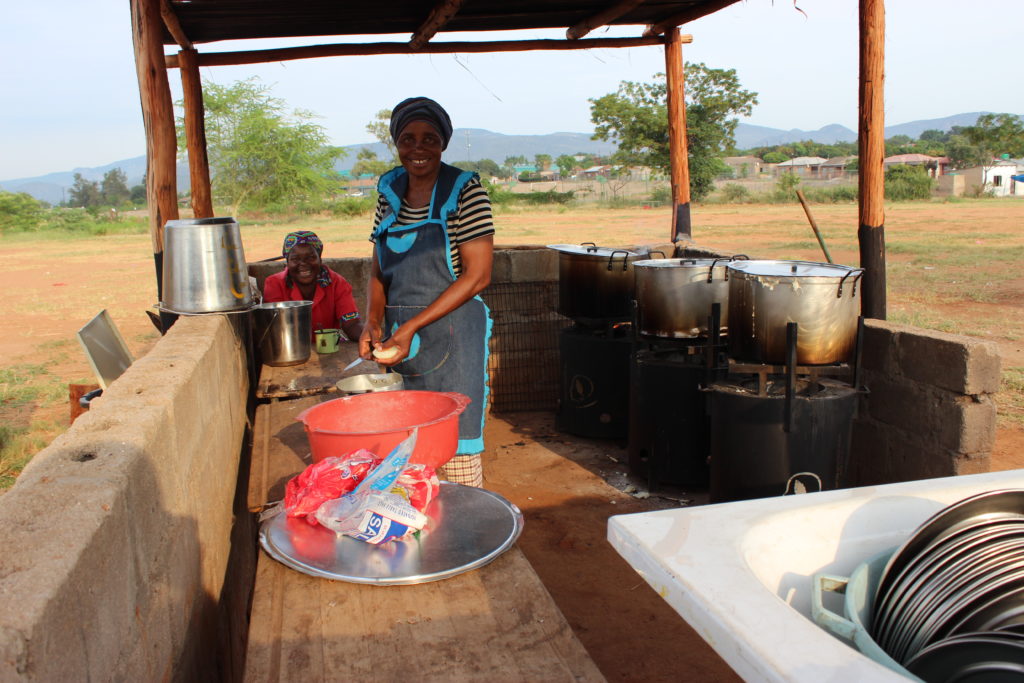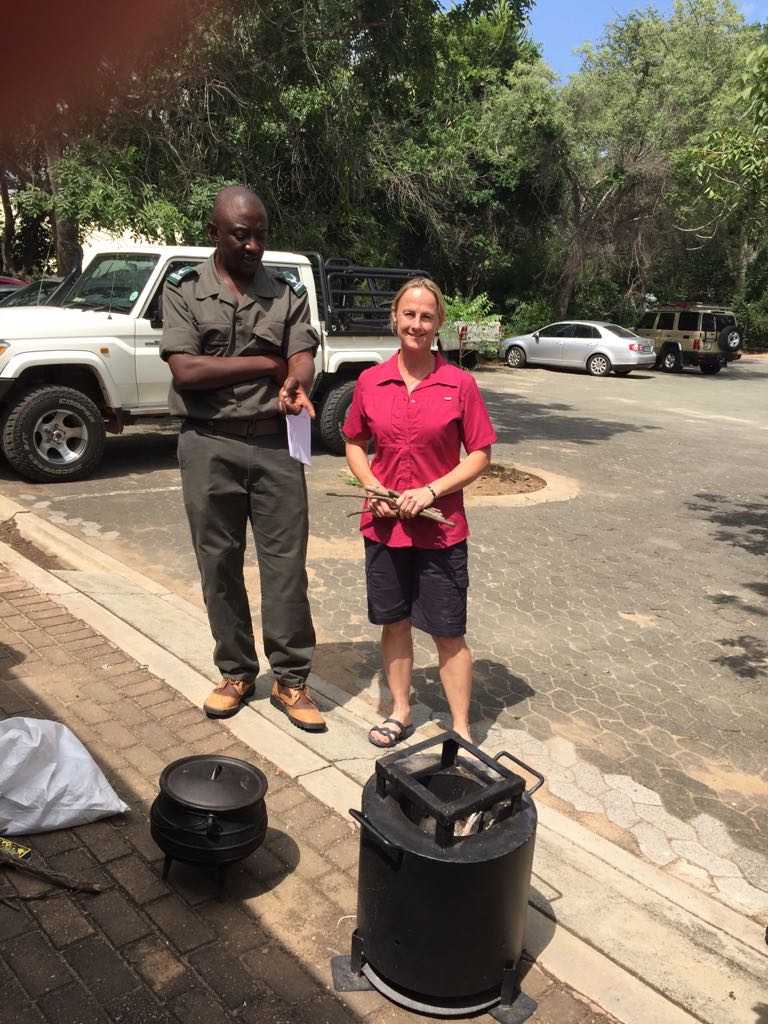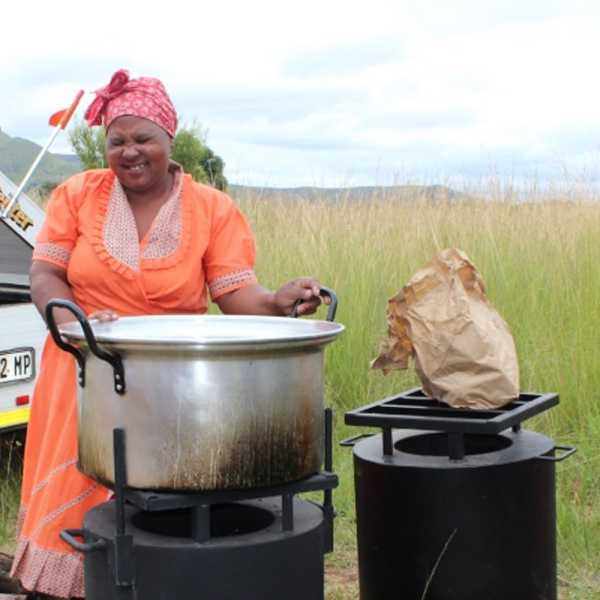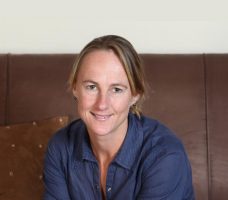
Sustainability Partners acknowledge that thousands of schools are reliant on wood to mass prepare food for hungry students. We are offering a fast, clean, and fuel saving solution that still uses wood but now half the fuel would be used with nominal smoke. We also show beneficiaries how to repurpose waste cardboard to make a supplementary fuel for the Mashesha stove.
Name: Sustainability Professionals (PTY) LTD
Location: Honeybird, Mpumalanga, South Africa
Website: www.mashesha.co.za
Product / Service Offering: Mashesha stoves
Founder Interviewed: Louise Williamson
Other Key Management Team Members: Ian Macaulay, Jurgen Halibach, Lulu Mbata, Felicity Weir, Dr. Charmaine Williamson
This article is part of our Women Entrepreneurs Spotlight series featuring female entrepreneurs and their companies. We hope these founders’ interviews will inspire and motivate you as you undertake your own entrepreneurial journey.
Tell us a little about yourself with a focus on what motivates you.
I have been working in rural communities on sustainable development projects for the last sixteen years. My passion for the environment makes me strive to make a positive impact in our community. I have been influenced by my parents who instilled a sense of moral ethics and a love for people and the environment. My aim is to improve the quality of life for impoverished communities by helping woman and schools to be able to receive the cook stoves and cheap reliable fuel.
When did you establish your company and where did the idea originate?
Sustainability Professionals was established in May 2015. I designed the Mashesha stove in 2014 to solve the cooking crisis in rural schools that were reliant on wood to prepare a meal for students daily.
At the time, I was working for an NGO which ran out of national funding. We all lost our jobs. Thankfully, I saw that there was a great potential for the Mashesha stoves. I started the social enterprise to sell Mashesha stoves and to train beneficiaries how to make a free supplementary fuel from waste cardboard, which burns just as well as wood in the Mashesha stove.
Ideation – A Step by Step Guide to Researching, Testing, and Refining Your Idea.
What need or needs does your company seek to fill for its customers?
- Save women time because the Mashesha uses half the wood a normal open fires does, which reduces the time woman spend collecting wood.
- As the stove burns so hot cooking time is reduced and this also saves woman time. The aim is to free up time so that woman can peruse activities/education, in which they are interested. Ultimately to promote gender equality and equity.
- Promote healthy cooking environment and reduce respiratory and eye diseases from reduced smoke exposure.
- Save people and schools money through reduced fuel loads needed. Money saved at schools can then be used for further educational activities.
- Mitigate global warming and climate change through the reduced emissions.
What is the one thing that sets your company apart from its competitors?
 Sustainability Partners acknowledge that thousands of schools are reliant on wood to mass prepare food for hungry students. We are offering a fast, clean, and fuel saving solution that still uses wood but now half the fuel would be used with nominal smoke. We also show beneficiaries how to repurpose waste cardboard to make a supplementary fuel for the Mashesha.
Sustainability Partners acknowledge that thousands of schools are reliant on wood to mass prepare food for hungry students. We are offering a fast, clean, and fuel saving solution that still uses wood but now half the fuel would be used with nominal smoke. We also show beneficiaries how to repurpose waste cardboard to make a supplementary fuel for the Mashesha.
What was the biggest challenge you faced while getting your company up and running, and how did you overcome it?
The biggest challenge for Sustainability Partners is the lack of startup capital for human resources. The result is me having to wear multiple hats in areas I am unfamiliar with, like financial administration and marketing. I overcame these to a certain extent through studying the fields. I am still busy receiving and applying for grants and awards which will allow us to scale.
Startup Funding – The 4 Types of Players [Infographic]
Are there resources you have utilized that other founders might find compelling or useful?
It is very helpful if a founder can participate in a business accelerator as this gives you a good foundation and often templates/insights you need for preparing business plans.
Accelerators Focusing on Women-led Startups
What steps have you taken to secure funding for your company and what, if anything, would you do differently if you had to start over?
I have participated in social impact/innovation competitions and fortunately won five awards. I am currently waiting to hear if I have been successful with a safe note loan from SPARK/YGAP. Most recently is that I am in the presidential round of the African Entrepreneurship awards. I will be pitching to judges and investor in Casablanca on December 6, 2017.
In hind sight, I would have gone to see a business advisor as many people wanted to join the business and ride the gravy train which resulted in Sustainability Partners losing money. I would have set up correct and legal structures for people wanting to partner with me.
Have there been any questions you have had as an entrepreneur of a fledgling startup that you had a particularly hard time finding the answers to?
I found it very difficult to work with and make assumptions for the three to five year financial projections preparations.
What challenges, if any, are you grappling with?
The main challenge is to secure sufficient funding for human resources and operating capital so that we can adequately scale the business and become sustainable.
What is the most helpful tip or “hack” you’ve ever learned, stumbled across, or been given?
The most helpful tip is to take time and thoroughly check the people that want to join the business and not to feel obliged to take on everyone that shows an interest.
Is there anything else you would like to share about your company?
 Our long term goal is to franchise the business and move into the SADC.
Our long term goal is to franchise the business and move into the SADC.
Advice to female entrepreneurs…
I would advise them first to get a good and well-rounded education. This would include being able to do public speaking, learn how to write for different audiences, follow the financial gurus’ advice, take sound financial courses. They should also tap into their networks and ask for other peoples’ views and advice. It is important for them to believe in their product or service and be their own best ambassador for their offering.
They should keep a sense of humor, have resilience, and also build balance in their lives. Work hard on the business venture, but also step back, do other creative work and get a sense of perspective on the core business that they are pursuing. Most of all, they must remember that their contribution makes the lives of people, animals, and the ecosystem a more creative and gentle space.
Are you familiar with other Women-led startups? If so, we would like to hear from you. Tell us about them in the comments below!










